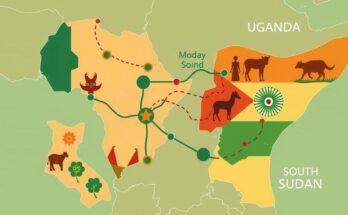Rwandan-backed rebels, led by the M23 militia, advanced into Goma, eastern Congo’s largest city, amid rising violence and humanitarian crises. Eyewitnesses reported clashes and looting. The M23 claims control while the Congolese military disputes this. The conflict is complicated by historical tensions and Rwanda’s military support, contributing to a worsening humanitarian situation.
Rwandan-backed rebels have advanced into the center of Goma, the largest city in eastern Congo, amidst escalating violence and humanitarian crises. The M23 militia, which is led by ethnic Tutsi, claimed to have taken control of the city, though independent confirmation of this claim remains elusive. Residents reported ongoing clashes and disturbances, including looting in the vicinity.
Gunfire erupted near key locations such as the airport and city center, with eyewitnesses noting confusion and sightings of soldiers in the area. Corneille Nangaa, from the Congo River Alliance, assured that M23 rebels were overpowering the Congolese military, with soldiers reportedly surrendering. In contrast, officials from the Congolese military insisted they maintained control of the airport despite these claims.
The eastern Democratic Republic of Congo (DRC) is plagued by over a hundred armed groups, remnants of two regional wars fueled by historical tensions following Rwanda’s 1994 genocide. The M23, previously captured Goma in 2012 but withdrew under international pressure, has restarted offensives, capitalizing on its military support from Rwanda.
The humanitarian impact has intensified, displacing thousands more in addition to the already over three million displaced prior to 2024. In response to escalating tensions, the U.N. Security Council convened discussions while Rwanda’s government laid blame on Kinshasa for impeding negotiations, further complicating the situation. The region remains volatile, necessitating urgent international attention.
The situation in Goma reflects a long-standing history of conflict influenced by ethnic strife and external interventions. Following the Rwandan genocide, Tutsi-led movements, supported by Rwanda, emerged to protect their communities from Hutu militias. Despite varying agreements and international interventions over the years, tensions have persisted in eastern Congo, contributing to a protracted humanitarian crisis and repeated military confrontations between government forces and rebel groups. The M23 has been a prominent player in this conflict, receiving significant military backing from Rwanda, exacerbating regional instability.
The escalation of conflict in Goma by Rwandan-backed rebels, particularly the M23 militia, underscores the precarious security situation in eastern Congo. While claims of control circulate, the realities on the ground remain complex, with significant human dislocation and international diplomatic efforts attempting to address the crisis. Continuous monitoring and intervention are essential to mitigate an already dire humanitarian scenario.
Original Source: www.voanews.com




